|
|
|
Sort Order |
|
|
|
Items / Page
|
|
|
|
|
|
|
| Srl | Item |
| 1 |
ID:
170271
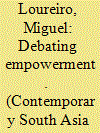

|
|
|
|
|
| Summary/Abstract |
In the aftermath of the 2005 earthquake that struck Pakistan-administered Kashmir an unprecedented number of development actors arrived in the region. Their impact influenced men’s perceptions of change in the gendered division of labour, as they claimed this arrival had increased women’s access to work in public spaces. Across urban and rural bazaars, a wide spectrum of male voices used this perceived increase to either try to further enhance women’s access or to curtail it. The struggle for women’s access to work in public spaces was visible in the stories these men told publicly. Although it pre-dated the earthquake, its aftermath made it more visible. Men’s narratives around women’s access to work post-earthquake also reflects a crisis of masculinity. The earthquake’s aftermath gave an opportunity for some men to reinforce the region’s classical patriarchy and others to challenge it; while doing so, men were also staking a claim at redefining what it meant to be a man.
|
|
|
|
|
|
|
|
|
|
|
|
|
|
|
|
| 2 |
ID:
170268
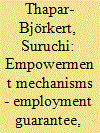

|
|
|
|
|
| Summary/Abstract |
The Mahatma Gandhi National Rural Employment Guarantee Act (NREGA) in India opens a new chapter in rural governance, signifying transformative potential for enhancing economic and social security. One of the key objectives of the Act is to aid in the empowerment of marginalised communities, especially women, Scheduled Castes (SCs) and Scheduled Tribes (STs). However, no analytically rigorous attempt has been made to study the mechanisms and processes that are leading to empowerment or even the (unintended) processes of disempowerment. Our paper investigates (dis) empowerment as a process rather than as a (quantifiable) outcome and analyses the mechanisms through which the embedded gender and caste norms are being challenged (though not completely eroded), but also how powerful actors at household, community and market levels can come to resent processes that entail upward mobility of women and marginalised communities. We draw on a comparative study based on extensive qualitative indepth interviews and participant observation, in rural areas of two Indian states, Uttar Pradesh (North India) and Andhra Pradesh (South India). The former exhibits almost all the elements we associate with low development, whereas the latter belongs to a group of southern Indian states with higher levels of human and economic development.
|
|
|
|
|
|
|
|
|
|
|
|
|
|
|
|
| 3 |
ID:
170266
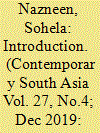

|
|
|
|
|
| Summary/Abstract |
Questions of women's power remain a matter of heated debate globally, but take on a heightened intensity in a South Asia featuring rapid economic growth and structural transformation in recent decades. This Special Issue aims to improve understanding of how the women of South Asia are gaining and exercising power and of the obstacles and backlash they face, moving beyond discussion of women's empowerment as a matter of control over domestic economic resources or labour market participation. Articles from Bangladesh, India, Nepal, and Pakistan examine the struggles of garments workers in global value chains, middle class professionals, subsistence farmers and wage labourers, tracing the actors, institutions, and movements that build or block women's pathways to power. Collectively, the articles argue for paid work to be treated as a critical arena for struggles over women's power, not an end in itself. They draw attention to the roles of states and patriarchal forces in building or blocking pathways to power, and to the resilient nature of gendered norms that serve patriarchy. And they highlight the need for research into women's empowerment to focus on key episodes of political contention, as critical junctures for the progress – or retreat – of women's empowerment.
|
|
|
|
|
|
|
|
|
|
|
|
|
|
|
|
| 4 |
ID:
170267


|
|
|
|
|
| Summary/Abstract |
Employment and work surveys in Nepal have shown a high concentration of women in certain occupations, being flexible, low paid and requiring low skill. In the far-western region (Jumla District, Karnali Zone), the Government of Nepal provides employment to women and men through a public works programme, the Karnali Employment Programme (KEP). This paper assesses the empowerment potential of the KEP and similar employment programmes, and questions whether paid work leads to economic empowerment for women. It provides a glimpse into work patterns in low-income families in Nepal, and juxtaposes the goal of women's economic empowerment through entry into the labour market with their lived realities and needs. The paper uses ILO's Decent Work framework to argue that two key aspects are critical for women's empowerment through paid work: firstly, quality; and secondly, a positive balance between paid work, unpaid work and care work.
|
|
|
|
|
|
|
|
|
|
|
|
|
|
|
|
| 5 |
ID:
170270
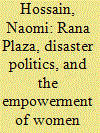

|
|
|
|
|
| Summary/Abstract |
Bangladesh’s garments workers have served as both an emblem of that country’s rapid social and economic progress, and of the precarities of labour in global value chains. Based on an understanding of how disaster politics have played out in Bangladesh’s history, this article explores whether and how the Rana Plaza disaster has been a critical juncture in the politics of the sector, resulting in a shift in power relations that empowers workers to demand and secure their rights. Drawing on a framework developed by Mark Pelling and Kathleen Dill for the analysis of the politics of natural disasters, the article explores the aftermath of the 2013 factory collapse in which 1,134 factory workers were killed. The article examines changes in workers’ own agency and resources, and in their relationships to the state and transnational actors. The article concludes that while the disaster was a turning point in key respects, it has not – unlike previous major disasters in Bangladesh – generated an elite consensus over the priority of workers’ rights and in particular of trade unions. Workers are more empowered than in the past but have yet to fully reverse their historical associational and structural disempowerment.
|
|
|
|
|
|
|
|
|
|
|
|
|
|
|
|
| 6 |
ID:
170272


|
|
|
|
|
| Summary/Abstract |
The women's movement in Pakistan strategically used the courts to fight for rights-based empowerment over the last 40 years. Its demand to hold the state and judiciary accountable for delivering on its constitutional promise of fundamental rights has led to landmark public interest litigation jurisprudence. This paper presents for the first time the movement's full history of litigation in its key areas of concern: sexual and reproductive rights, protection from discriminatory laws and informal justice mechanisms, socio-economic and environmental rights and political rights. Achievements include positive verdicts, sensitizing judges, progressive legislation and increased public awareness.
|
|
|
|
|
|
|
|
|
|
|
|
|
|
|
|
| 7 |
ID:
170269
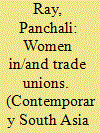

|
|
|
|
|
| Summary/Abstract |
This essay draws from an ethnographic study on nurses and attendants in the city of Kolkata to re-turn to the question of women’s consciousness and agency. I trace women’s reluctance to participate in union activities both to the failure of formal mechanisms of collective bargaining in representing workers’ interests, and to gendered norms that come in the way of organizing women workers. I explore how the performance of respectable femininity, legitimized by class and caste norms, inhibits women’s participation in intensely politicized masculine domains. Though at first glance it may seem that women’s reluctance to participate in union activities is gender neutral, I demonstrate that gender norms produce a social field that denies women political agency.
|
|
|
|
|
|
|
|
|
|
|
|
|
|
|
|
|
|
|
|
|